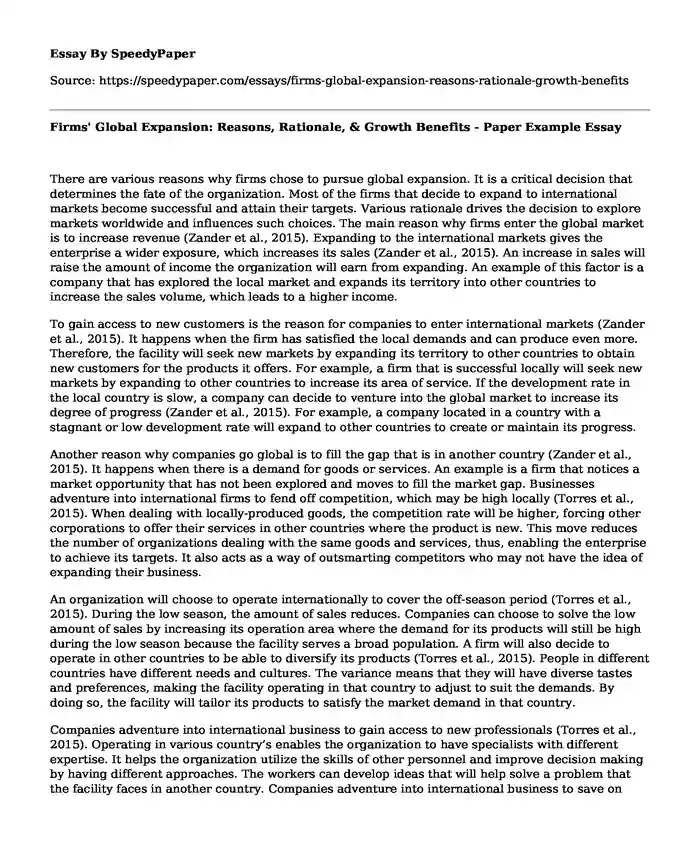There are various reasons why firms chose to pursue global expansion. It is a critical decision that determines the fate of the organization. Most of the firms that decide to expand to international markets become successful and attain their targets. Various rationale drives the decision to explore markets worldwide and influences such choices. The main reason why firms enter the global market is to increase revenue (Zander et al., 2015). Expanding to the international markets gives the enterprise a wider exposure, which increases its sales (Zander et al., 2015). An increase in sales will raise the amount of income the organization will earn from expanding. An example of this factor is a company that has explored the local market and expands its territory into other countries to increase the sales volume, which leads to a higher income.
To gain access to new customers is the reason for companies to enter international markets (Zander et al., 2015). It happens when the firm has satisfied the local demands and can produce even more. Therefore, the facility will seek new markets by expanding its territory to other countries to obtain new customers for the products it offers. For example, a firm that is successful locally will seek new markets by expanding to other countries to increase its area of service. If the development rate in the local country is slow, a company can decide to venture into the global market to increase its degree of progress (Zander et al., 2015). For example, a company located in a country with a stagnant or low development rate will expand to other countries to create or maintain its progress.
Another reason why companies go global is to fill the gap that is in another country (Zander et al., 2015). It happens when there is a demand for goods or services. An example is a firm that notices a market opportunity that has not been explored and moves to fill the market gap. Businesses adventure into international firms to fend off competition, which may be high locally (Torres et al., 2015). When dealing with locally-produced goods, the competition rate will be higher, forcing other corporations to offer their services in other countries where the product is new. This move reduces the number of organizations dealing with the same goods and services, thus, enabling the enterprise to achieve its targets. It also acts as a way of outsmarting competitors who may not have the idea of expanding their business.
An organization will choose to operate internationally to cover the off-season period (Torres et al., 2015). During the low season, the amount of sales reduces. Companies can choose to solve the low amount of sales by increasing its operation area where the demand for its products will still be high during the low season because the facility serves a broad population. A firm will also decide to operate in other countries to be able to diversify its products (Torres et al., 2015). People in different countries have different needs and cultures. The variance means that they will have diverse tastes and preferences, making the facility operating in that country to adjust to suit the demands. By doing so, the facility will tailor its products to satisfy the market demand in that country.
Companies adventure into international business to gain access to new professionals (Torres et al., 2015). Operating in various country’s enables the organization to have specialists with different expertise. It helps the organization utilize the skills of other personnel and improve decision making by having different approaches. The workers can develop ideas that will help solve a problem that the facility faces in another country. Companies adventure into international business to save on cost (Torres et al., 2015). The cost of operation reduces when operating globally as compared to one country. An example is an organization that moves its manufacturing operations to another country due to the availability of cheap labour. It will reduce the amount of capital needed to operate, thus, saving on cost.
Companies choose to operate globally to reduce the dependence of the local market (Zander et al., 2015). The local market may be unpredictable or may have various challenges, like government intervention with policies such as high taxes. The increased amount of taxes forces institutions to seek greener pastures in multiple parts of the globe with favorable policies. Thus, going global enables the firm to achieve the enterprise's objectives by selecting countries that the company will perform best.
References
Torres-Ortega, R., Rialp-Criado, A., Rialp-Criado, J., & Stoian, M. C. (2015). How to Measure Born-Global Firms’ Orientation Towards International Markets? Revista Española de Investigación de Marketing ESIC, 19(2), 107-123. https://daneshyari.com/article/preview/1029698.pdf
Zander, I., McDougall-Covin, P., & Rose, L. (2015). Born Globals and International Business: Evolution of a Field of Research. Journal of International Business Studies, 46(1), 27-35. https://www.researchgate.net/publication/271857138_Born_globals_and_international_business_Evolution_of_a_field_of_research
Cite this page
Firms' Global Expansion: Reasons, Rationale, & Growth Benefits - Paper Example. (2023, Nov 22). Retrieved from https://speedypaper.com/essays/firms-global-expansion-reasons-rationale-growth-benefits
Request Removal
If you are the original author of this essay and no longer wish to have it published on the SpeedyPaper website, please click below to request its removal:
- Human Resource Challenges in Yahoo - Essay Sample
- Essay Sample on How to Measure Brand Equity
- Free Essay on Overview of the Three Tourism Organizations Visited
- Essay Example on the Globalization of the English Premier League
- Analysis of New Market Segment. Paper Example
- Paper Example: Globalization and Reform
- Free Essay Example. Impact of Ethical Leadership in Project Management
Popular categories





